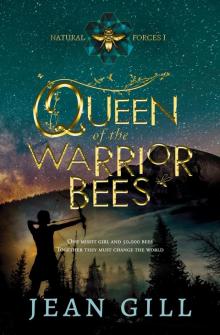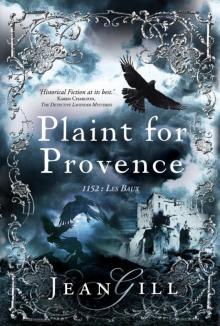Queen of the Warrior Bees Read online
From award-winning author Jean Gill, author of The Troubadours Quartet
Winner of the Global Ebooks Award for Best Historical Fiction
Finalist in the Kindle Book Awards, the Wishing Shelf Awards, Cinnamon Press Novella Award and the Chaucer Awards
‘Evocative and thoroughly riveting. A vividly-written, historical saga.’ The Wishing Shelf
* * *
‘I highly recommend all four books. You will love this historical fantasy!’ Autumn Birt, The Rise of The Fifth Order
* * *
‘Fascinating history – the plot was terrific.’ Brian Wilkerson, Trickster Eric Novels blogger
* * *
‘You will not find any better historical fiction, nor a more powerful evocation of a vivid past than in Gill’s brilliantly written series.’ Paul Trembling, Local Artist
* * *
‘A remarkable achievement. Every character, and that includes the horses, dogs and hawks, is bursting with vitality, and Gill's lush descriptions of Moorish palaces seduce you as they send you on a journey full of treachery, adventure and romance.’ Deborah Swift, Pleasing Mr Pepys
* * *
‘Gill’s skill at moving from culture to culture, savoring the distinctive colors of each, is breath taking.’ Elizabeth Horton-Newton, Carved Wooden Heart
* * *
Praise for Someone to Look Up To
Litpick Student Reviews TOP PICK Award 'A very moving book... superbly written'
* * *
‘Thank you for the wonderful experience of being in a dog’s head. I’ve often wondered what a dog's world was all about. Now I know.’ Claire Stibbe, The 9th Hour
Queen of the Warrior Bees
Natural Forces Series Book 1
Jean Gill
Contents
Join my Special Readers’ Group
Chapter 1
Chapter 2
Chapter 3
Chapter 4
Chapter 5
Chapter 6
Chapter 7
Chapter 8
Chapter 9
Chapter 10
Chapter 11
Chapter 12
Chapter 13
Chapter 14
Chapter 15
Chapter 16
Chapter 17
Chapter 18
Chapter 19
Chapter 20
Chapter 21
Chapter 22
Chapter 23
Chapter 24
Chapter 25
Chapter 26
Chapter 27
Chapter 28
Chapter 29
Chapter 30
Chapter 31
Chapter 32
Chapter 33
Chapter 34
Contact
Acknowledgements
About the Author
My Book Recommendations
Someone To Look Up To
Left Out
Fortune Kookie
Jean Gill’s publications
Book One: Queen of the Warrior Bees
Jean Gill
© Jean Gill 2019
Ebook Edition
The 13th Sign
* * *
First published in 2019
* * *
All rights reserved. No part of this publication may be reproduced, stored in a retrieval system, or transmitted in any form without prior permission from the publisher.
* * *
This is a work of fiction. Names, characters, organisations, places and events are either products of the author’s imagination or are used fictitiously.
* * *
Cover design – Jessica Bell
Cover art – art4stock, Michel Angeloop, Ales Krivec, Teddy Kelley
For exclusive news and offers, signup here for
Jean’s Special Readers’ Group
Subscribers are welcomed with a FREE copy of
Song at Dawn,
‘Like Game of Thrones but with real history’
Book 1 in the award-winning Troubadours Quartet.
‘Historical Fiction at its best.’ Karen Charlton, the Detective Lavender Mysteries
For Anita Kovacevic
who loves the Forest as much as I do
* * *
Dwi wedi dod yn ôl at fy nghoed
Welsh proverb meaning ‘I have returned to my trees’
(I have come back to my senses)
Chapter One
Why was the Forest forbidden? The very word was unmentionable. Yet everybody knew it was out there. Otherwise, how could children scare each other with whispered stories of what might be in the Forest? Gigantic sticky-buds, striped man-eaters, slithery poison? Their imaginations ran wild in a tamed world. But as each child reached Maturity and passed – or failed – the ritual test, the word Forest disappeared from the new adult’s mind, like a leaf dropping in autumn.
Mielitta had tried to ask adults why the Forest was forbidden but the word tied her tongue in tangled roots and instead she found herself asking the way to the schoolroom, or some other question so ludicrous that she was mocked for her stupidity. She sensed magecraft twisting her words but she could not force a different path from the one required of good citizens.
Now she was the only child who'd seen eighteen year-cycles and still been told she was not ready for testing. Her old playmates moved around the same halls as she did, girls in silken robes, boys in leatherette jerkins and long trews, while she still wore a tabard over a child’s short britches and stuffed her hair into the coarse netting of a servant’s ugly snood.
Flowers, thought Mielitta, as three girls in gowns like satin petals rustled past her. Grace, Felicity and Espoir had turned into a golden daffodil, a blue pansy and a violet campanula respectively. Mielitta knew these flowers from the books in the library, which she was tasked with cleaning each week. She remembered when the golden daffodil used to play leapfrog against the stable wall and when the violet campanula had linked pinkie fingers with her, swearing friendship forever. But even then, her finding had set her apart. All the other children had been born in the Citadel, not discovered as a baby by the Mage-Smith. She would always be a foundling, a freak.
‘The stones be with you, Lady Grace, Lady Felicity, Lady Espoir,’ murmured Mielitta, lowering her eyes. Barely nodding slender necks, expressions stonier than the walls they passed, the ladies swished past in silence, the better to ignore such a freak.
Had they forgotten her when they reached maturity? Or did they prefer to forget their broken promises, made by childish pinkie fingers?
As the chirruping gossip started up again behind her, Mielitta was warned of a potentially worse encounter by the brown scent of peat, a metallic clank and rumbling voices. She shrank into the shadows of an alcove, held her breath. Whichever route she took from her bed to the kitchen, there was always the risk of meeting Jannlou and his cronies.
She willed herself invisible, wished she had the powers to really be so. Children entertained each other with such stories and the books she read in the library, while she was supposed to be working, tantalised her with magical possibilities for every citizen. But adults never spoke of such powers outside magecraft. It wasn’t a banned subject, like the Forest. More like a pointless train of thought, as if magecraft was the privilege of the chosen few, controlled, and those who lacked it were unimportant. Whereas the Forest was dangerous. How Mielitta knew this, she couldn’t say. She just did. In the same way she knew that people like her had no magecraft. And people like Jannlou, did.
‘My father says we must strengthen the walls of the western keep.’ His voice was deep and echoed in its confident authority but Mielitta knew the speaker was her own age. They had not linked pinkie fingers as child
ren and if anything had been sworn, it was eternal enmity. Mielitta had no idea why Jannlou wanted to make her life a misery. It was just another fact of her cursed life.
‘Is there a threat?’ A smoother voice. Bastien, whose fast-talking explanations always put Mielitta in the wrong. She had never snitched, even on Jannlou, but Bastien’s confessions had blamed her for a tipped bucket of water on precious books or a damaged bow in the archery yard. After all, the freak’s clumsiness was legendary. Bastien himself had created that legend and Mielitta wore her reputation like a porcupine shirt, prickles inside.
He had excelled himself with his martyred performance after Jannlou accidentally knifed him in a schoolroom rough-house. When the schoolmaster returned and questioned Bastien about the cut, he ‘couldn’t say… couldn’t tell on a girl…’ and indicated Mielitta with his eyes. As the knife had magically appeared on her desk, there was little she could say in her defence. Not that she wanted to. Not when seventeen classmates apparently accepted that she’d caused the wound. Were they scared of Jannlou and his gang? Or genuinely magicked out of their memory? She preferred to believe the latter, but then why did such magecraft never work on her?
‘There may be a threat,’ Jannlou replied to Bastien’s question. ‘My father has had word from across the Wilderness. Of,’ he hesitated, ‘of something. I can’t say more and especially not here. You never know who might be listening.’ He turned his head as he passed the alcove, his nostrils flared and he held Mielitta’s gaze in his own, red in the torchlight. Even though she looked down quickly she felt the heat, burning. If he wanted to, Jannlou could blaze light across the stone passage, reveal her. He walked on.
Like reptiles, thought Mielitta, as the young men passed. Especially Bastien. Fork-tongue. Chain-mail hauberks and hoods glittered like crocodile scales. Huge buckles on belts and backpacks gleamed and clinked. As they grew older and gained experience, those belts would acquire trophies, filling the spaces with symbols of achievement.
I would like that as a job. Engraving belt motifs. Next time I go to the forge I will ask Declan if I can work for him instead of this endless cleaning and table-waiting. If I am to be a child-servant until I die, then I should seek a position that suits my situation.
She followed this distracting line of thought as the last echo of boots faded and all she could hear was her heart pounding. Why hadn’t Jannlou taken the chance offered? Maybe he hadn’t seen her at all. It had just been her imagination. Burning eyes! Among the books she dusted and read, there was a section full of men with burning eyes. Clearly, she should take more care. Maybe she wasn’t immune to all forms of magical influence after all.
She rushed along the passageway to the kitchen, where a cauldron of soup bubbled. Today it contained orange vegetables and would be called carrot soup. Maybe the diners could taste a difference because they saw a different colour and shape to the bits in their hot water each day but to Mielitta, the food always tasted the same. It tasted of salt and Citadel water.
She had learned from her own body, sweat and blood, that tastes could be different, and her palate found the daily sustenance dull. As if she knew that something better was possible.
The same was true of scent. The Citadel food had no smell, just temperature, tepid or cool. But Mielitta could distinguish all the scents around her; dusty books in the library, laundered clothes and bedlinen, smoke and molten steel in the forge. She could smell them and see their scents in colour.
That was probably why she’d received a year-cycle gift this morning, with the instruction that she should keep it secret. When she woke up, there it was on her bed, a carved wooden box with a tiny scroll and phial inside.
My parents, was her first thought. Maybe they were waiting until my eighteenth year-cycle to tell me who I am. Who they are. Or who they were.
But no, the sender was anonymous. The writing on the scroll was in spidery green ink and made no sense. A riddle.
When the bottle is empty, you will be full.
No life ends while The One lives.
In the year of the prophecy, choose well.
She’d scrunched up the paper and thrown it on the floor but she unstoppered the phial, curious. Her nose filled instantly, glutted, as she inhaled, savoured. Her untrained nose smelled immediacy and many layers. Book-words offered themselves: musk, attar of roses, geranium, sandalwood. She’d experienced none of these but their names waited for the day she did.
She breathed deeply. She had to find words for these scents. A fruit bowl. Not the kind she now carried into the Great Hall after the evening meal, as fake as the carrot soup, but squashed blackberries, apricot smoothness and lime zest. Bound with something unexpected, mild, creamy, yellow… banana. Yes, that was the word. Banana. She had no idea how she could identify each scent but she would bet a week’s food on being right. If only she could have food scented like this instead of the usual dull sustenance.
There was more to life than this bland existence. There must be. She had dabbed the perfume on her wrists, wafted in a cloud of scented beauty, waited to be told there was something different about her. All day she had worn her cloud but nobody had noticed. She was still invisible unless she failed or disappointed.
‘Stop daydreaming and give me that bowl!’ the fat man at the table growled at Mielitta. ‘The smell’s driving me crazy with hunger and you stand there like an idiot!’
For a minute, Mielitta thought he meant her smell.
‘Mmm, carrot soup.’ He sucked his moustache with enthusiasm before giving the same attention to the bowl in front of him. ‘My favourite.’
Bemused, Mielitta sniffed the other bowl of soup she carried. Nothing. As if she lived in a different world.
‘Mielitta!’ This voice was right in her ear and she jumped, spilling some soup. ‘Idra isn’t feeling well so you need to take her place. Take wine to the Council Chamber right away. They’ve eaten already and are meeting now.’
‘Ten goblets?’ asked Mielitta. Her heart pounded, knowing the answer. Ten Councillors, ten goblets. She was never tasked with the Council Chamber. The most powerful people in the Citadel wouldn’t want to see a misfit, living proof that their rule did not have a place for everyone. Clearly the steward was willing to overlook Mielitta’s unfitness for the task in view of her being available, now. And she knew her way around the Citadel, unlike the little ones who beamed as they served table. Had Mielitta ever been so young, so enthusiastic?
She was still pondering the question as, with a still-beaming follower, she carried a tray to the square tower of the keep, climbed the seventy-two spiral steps and waited. Chewing his lower lip as he carried out his instructions, her young helper gave three great taps with his stick on the oaken door and opened it for Mielitta. She touched the door, breathed in its musty toasted age, marvelled at the luxury of real wood instead of woodette. Apart from the stones themselves, little in the Citadel was of natural origin, and the real wood must have come from the Forest.
‘Bring another pitcher every hour,’ she instructed the little boy, who bowed and left, proud of being so useful.
Accustomed to the signal, the mages at the table didn’t look up. Mielitta set down the tray, took a pitcher of red water, that smelled of nothing and tasted of salt, and began to pour. The steward need not have worried. Nobody in the Council Chamber had eyes for a servant, however over-age and odd, and smelling of bananas. An invisible servant who had eyes, ears and a remarkable nose, and who intended to make use of them.
Chapter Two
The ten faces were known to everyone but usually Mielitta saw them from the back of the Great Hall, where she sought her usual invisibility. The Council of Ten would be on the raised podium at the other end of the Hall, either eating at the High Table or speechifying or both. This was the first time she’d been so close and the room crackled with barely suppressed power.
In her mind, she named them one by one, round the table, starting with Jannlou’s father, Magaram. Grey hair feathered above
his ears into a dusty black mane. No doubt it was once sleek as a colt’s, worn in a warrior’s queue, like his son’s today. The same deceptive blue eyes, even more startling against the seamed shadows of weathered chestnut skin. The same smell.
Mielitta inhaled, tried to separate the human scents in the room until she could distinguish each person by smell but that was too difficult. She could only identify those she already knew – and two others, pungent and clashing.
Magaram was easy to recognise because of all the times she’d hidden from Jannlou, his earthy tang a warning. His father carried the same rich brown scent. Mielitta saw smells this way, in colours and book-words, though she had no experience of earth, any more than of blackberries. All her life, words had popped into her head to match each new experience, released from her deep thinking. She just knew. And she’d quickly realised that the other children didn’t. Not even Declan knew the words she did so she learned to keep quiet about her sharp gold senses and her book-world.

 Queen of the Warrior Bees
Queen of the Warrior Bees Song Hereafter
Song Hereafter Someone to Look Up To
Someone to Look Up To Bladesong
Bladesong How Blue Is My Valley
How Blue Is My Valley Plaint for Provence
Plaint for Provence Song at Dawn: 1150 in Provence (The Troubadours Quartet)
Song at Dawn: 1150 in Provence (The Troubadours Quartet)